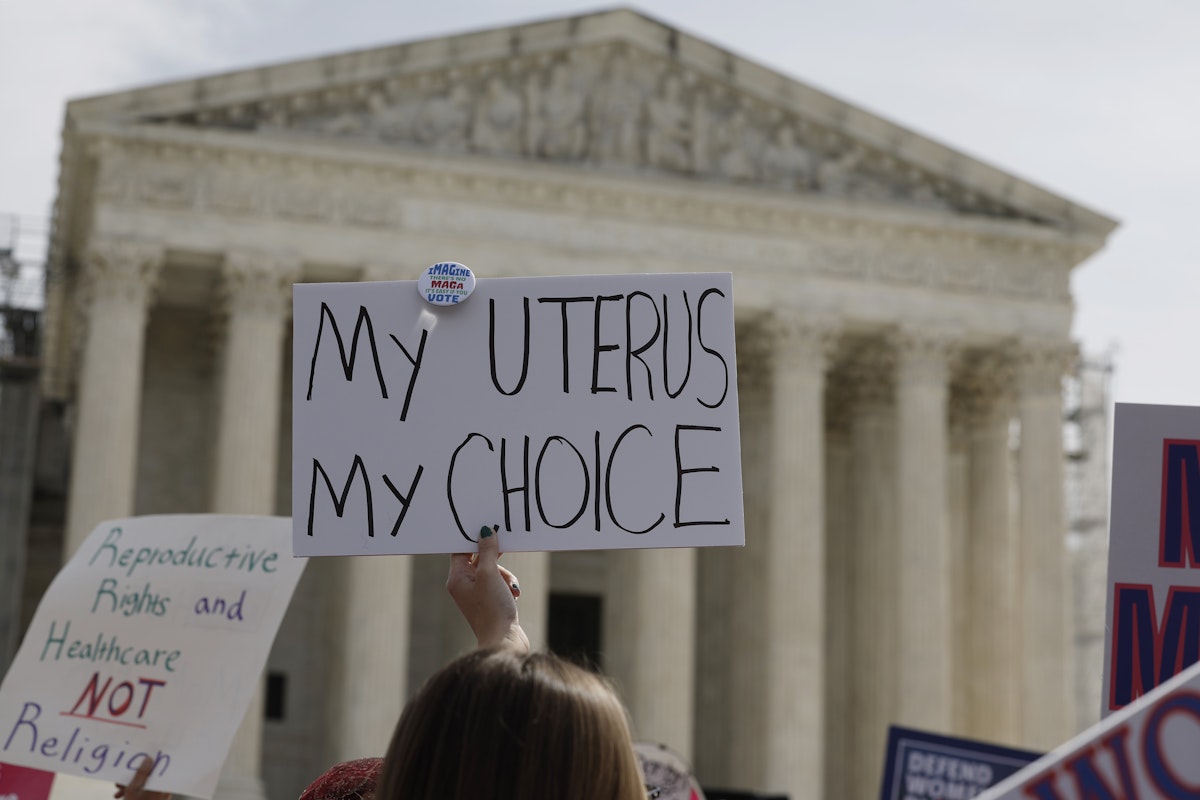The Latest Supreme Court Case on Abortion Is the Scariest One Yet
The Supreme Court will hear another abortion case on Wednesday, providing the nation’s highest court with another opportunity to ban the medical procedure.The case, United States v. Idaho, will argue whether pregnant people in the Gem State are allowed to get abortions when receiving lifesaving, critical care at hospitals, or if they and their fetus will be considered two separate people.Idaho already has a near-total abortion ban, but the Alliance Defending Freedom, the far-right Christian legal advocacy group arguing the lawsuit on behalf of the state, is utilizing the case to advance the idea of fetal personhood. This stipulation would effectively require doctors to treat fetuses—no matter how underdeveloped—with the same medical care as the person carrying it, even if it poses a medical risk to the pregnant patient.“Idaho’s law would make it a criminal offense for doctors to provide the emergency medical treatment that federal law requires,” Attorney General Merrick Garland said in 2022.Pro-abortion activists have argued that providing equal human rights to a fetus—especially if it’s a cluster of cells—will effectively strip pregnant people of their own rights, reported freelance journalist Susan Rinkunas. An amicus brief in the case specifies that, if the court rules for Idaho, it will “succeed in demoting pregnant women to second-class status under EMTALA,” a federal law that requires emergency rooms that run on Medicare funding to provide care to any individuals who show up.“Only pregnant women will be forced to surrender their EMTALA rights to make healthcare decisions about their bodies, and only pregnant women will have treatment guaranteed under federal law limited to Idaho’s prohibitory terms,” the brief reads. “Pregnant women stripped of their EMTALA rights under bans like Idaho’s have already experienced devastating harms because of the denial of abortion care. They have endured severe hemorrhage, life-threatening infection, and the trauma of painful, hours-long vaginal delivery of a non-viable fetus.”“If Idaho prevails and pregnant women’s EMTALA rights are allowed to vary State-to-State, these appalling, and completely avoidable, injuries will proliferate everywhere there are bans like Idaho’s,” it continues. “And, in lock-step, denial of emergency abortions under EMTALA will contribute to this country’s already-abysmal rates of maternal mortality and morbidity, which—like all reproductive harms—are racially disparate.”The notion of fetal personhood has also been leveraged to restrict IVF access in states such as Alabama and limit access to forms of birth control.

The Supreme Court will hear another abortion case on Wednesday, providing the nation’s highest court with another opportunity to ban the medical procedure.
The case, United States v. Idaho, will argue whether pregnant people in the Gem State are allowed to get abortions when receiving lifesaving, critical care at hospitals, or if they and their fetus will be considered two separate people.
Idaho already has a near-total abortion ban, but the Alliance Defending Freedom, the far-right Christian legal advocacy group arguing the lawsuit on behalf of the state, is utilizing the case to advance the idea of fetal personhood. This stipulation would effectively require doctors to treat fetuses—no matter how underdeveloped—with the same medical care as the person carrying it, even if it poses a medical risk to the pregnant patient.
“Idaho’s law would make it a criminal offense for doctors to provide the emergency medical treatment that federal law requires,” Attorney General Merrick Garland said in 2022.
Pro-abortion activists have argued that providing equal human rights to a fetus—especially if it’s a cluster of cells—will effectively strip pregnant people of their own rights, reported freelance journalist Susan Rinkunas. An amicus brief in the case specifies that, if the court rules for Idaho, it will “succeed in demoting pregnant women to second-class status under EMTALA,” a federal law that requires emergency rooms that run on Medicare funding to provide care to any individuals who show up.
“Only pregnant women will be forced to surrender their EMTALA rights to make healthcare decisions about their bodies, and only pregnant women will have treatment guaranteed under federal law limited to Idaho’s prohibitory terms,” the brief reads. “Pregnant women stripped of their EMTALA rights under bans like Idaho’s have already experienced devastating harms because of the denial of abortion care. They have endured severe hemorrhage, life-threatening infection, and the trauma of painful, hours-long vaginal delivery of a non-viable fetus.”
“If Idaho prevails and pregnant women’s EMTALA rights are allowed to vary State-to-State, these appalling, and completely avoidable, injuries will proliferate everywhere there are bans like Idaho’s,” it continues. “And, in lock-step, denial of emergency abortions under EMTALA will contribute to this country’s already-abysmal rates of maternal mortality and morbidity, which—like all reproductive harms—are racially disparate.”
The notion of fetal personhood has also been leveraged to restrict IVF access in states such as Alabama and limit access to forms of birth control.



